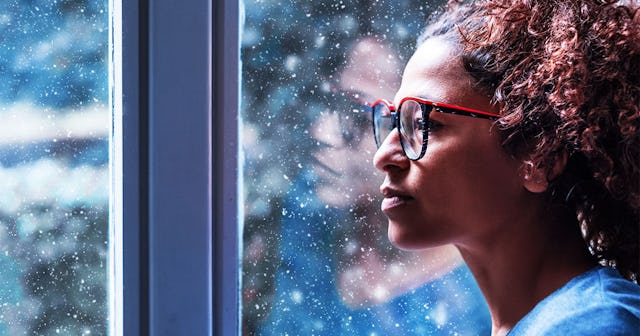How To Get Ahead Of Pandemic Winter Depression Right Now

One morning we woke up to temperatures in the thirties. Hello, fall! All of a sudden, our shorts and tees were going in storage bins and we were furiously trying to find the kids’ jackets. Summer had slipped away as quickly as it had arrived, which got me thinking about the long, cold months ahead. This winter will be different than the others, because not only do we worry about strep, influenza, and colds, but now we also have COVID-19.
As with many parents, the winter months are hard on us. We live in the Midwest where winter begins in November or December and can last well into March. Every day during those endless weeks, I crave a trip to the beach, especially sunshine and warmth. Meanwhile, my kids are literally bouncing off the walls. Is it possible that before we sink into a black hole of winter and pandemic depression, we can proactively battle it?
https://www.instagram.com/p/B98NmBUJbby/?utm_source=ig_web_copy_link
We asked Dr. Sanam Hafeez, a neuropsychologist in New York City and faculty member at Columbia University, to share her thoughts. She says during the summer months, many of us have found clever avenues of socializing outdoors safely. However, winter poses a new challenge. With colder temperatures in almost every state and many of us forced to stay indoors, “this comes with the price of some increased isolation that could lead to depression.”
What are the symptoms of depression? Dr. Hafeez says that adults should watch out for “sleeping too much or too little, changes in appetite (overeating or eating very little), lethargy, mood swings, loss of interest in activities that used to bring pleasure, feelings of sadness and hopelessness, trouble thinking and concentrating, and thoughts of suicide.” Children, including teens, may express similar symptoms as adults.
Unfortunately, many of us turn toward unhelpful habits and relationships rather than deal with the real issues. Online shopping, alcohol or drug abuse, gambling, or engaging in toxic relationships may give us temporary gratification, but they do a lot of harm, both in the short-term and possibly the long-term. Dr. Hafeez said, “Most people know what their weakness is, and where they are most likely to turn first and when they are most likely to do it. For example, if drinking is your addiction/dependency, and this is something you turn to after your workday or when the kids have been put to bed, you need to pre-empt this with something else in your life at that time.” (If self-managing isn’t enough, you need professional intervention.)
If someone is experiencing symptoms of depression, what should they do? Dr. Hafeez wants us to go outside. We shouldn’t underestimate the benefits of “a brisk walk, getting fresh air, and being in nature” because they are therapeutic. She added that we should “establish a very small network of ‘safe’ friends” you can trust to get together for “dinner, a game of cards, or a movie” (with masks on, of course). Human contact, according to her, is critical to our mental health. She also urges us to get our vitamin D3 level checked via blood test to make sure that is at an optimal level.
What else can we do? As much as we want to carb-load and consume all the sugar, eating better can impact not only our physical health, but also our mental health. Winter may also be the most optimal season to learn a new skill or take up a hobby. She offered a few examples such as learning to play an instrument or learning a new language.
Another option is to consider getting a lightbox, which can help those dealing with SAD (seasonal affective disorder), though they can be expensive. We shouldn’t underestimate the power of hygge, something I recently learned more about. Dr. Hafeez encourages us to light some candles and listen to relaxing music or utilize a meditation app.
https://www.instagram.com/p/CFGNHwIjzqa/?utm_source=ig_web_copy_link
You may be thinking this sounds impossible. If you have kids like I do, there’s very little time to relax without interruption. I’ve found it helpful to get my kids in on some of these. My youngest kids love to meditate with me, as long as the meditation is short-and-sweet. Family movie nights, baking together, or engaging in some of their favorite activities that are fun for me, like building with LEGO, provides some serious stress relief. My husband and I are also working out how each of us can get alone time, several times a week, while the other watches the kids.
Of course, if these don’t help, it’s important to get into contact with a mental health professional. Dr. Hafeez wants you to know that the spiral into depression doesn’t mean you should “feel ashamed or defeated.” Needing help is not the problem; not seeking help when you need it is. Once you find someone to work with, make sure you are honest with them so you can get the assistance you need. Dr. Hafeez encourages us not to “paint a rosier picture” than what’s truly occurring in your life. Medication may be another avenue to help you.
https://www.instagram.com/p/CGCoxrQhoHw/?utm_source=ig_web_copy_link
The fact is, the pandemic is taking an emotional toll on all of us, but with the upcoming winter season, some may be hit even harder. It’s critical that we create a plan now to proactively combat winter depression, rather than wait to see if we hit rock bottom, especially for those who routinely have seasonal depression during any given year. By taking care of our own mental health, we are better partners and parents, and we will feel better too.